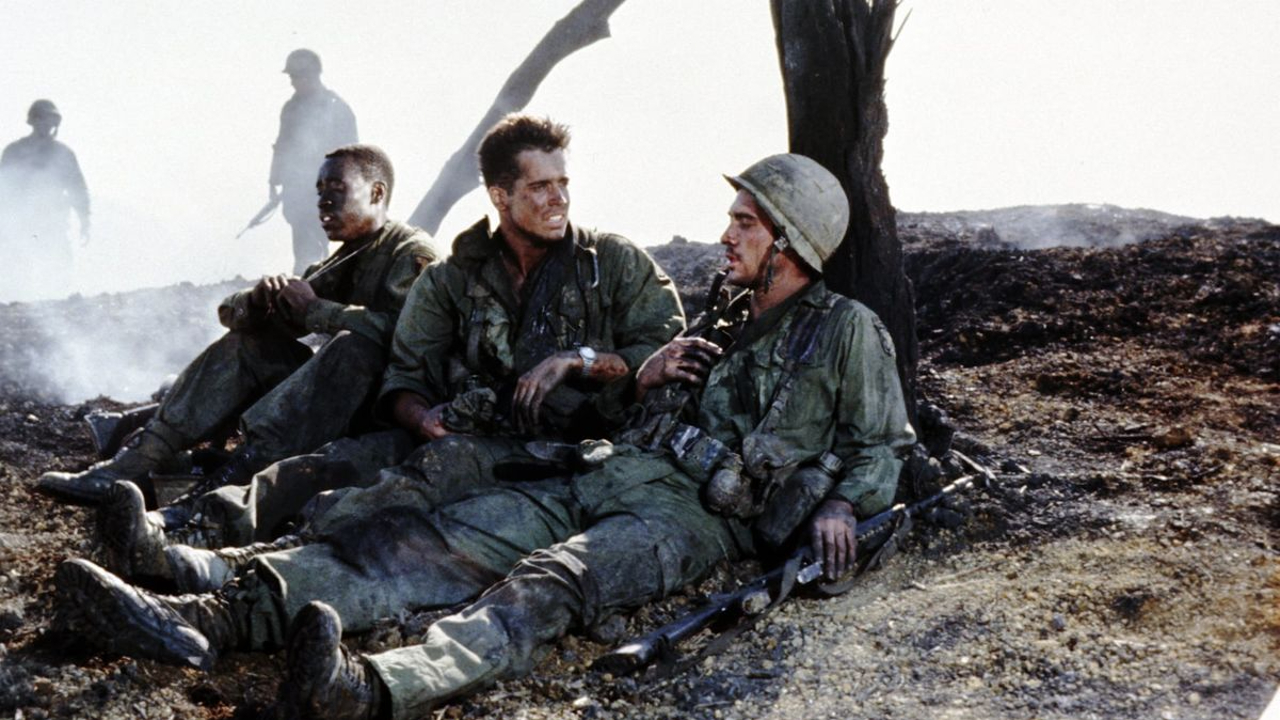The Best Vietnam War Movie You've Never Seen
The War For Hills And Trails - The Suffocating Misery Of Hamburger Hill

Which is, unsurprisingly, how the action manifests. Irvin had developed a reputation as a solid action filmmaker across the 1980s, delivering commendable work on the Christopher Walken-starring mercenary flick, The Dogs of War, and a lesser albeit still entertaining Arnold Schwarzenegger vehicle in Raw Deal. Hamburger Hill boasts his most technically impressive accomplishments, though, moving on from the casual violence of the aforementioned films to render something much more visceral and upsetting.
Bolstered by some blistering cinematography from Rambo III director Peter MacDonald, the visuals of Hamburger Hill transcend the Cronkite-esque or poetic to become something horrifically tangible, exposing the hell beyond the patently hellish. The film reiterates the familiar in that the combat experience for U.S. soldiers was terrible, but that not even the trailblazing reporting did justice to that. The emotional turmoil, the physical wounds and death - there’s an unquantifiable toll of suffering only those who went through it will be able to appreciate, an element of subtext rendered explicit when Frantz confronts a member of the media following a gruelling daytime assault.
Heads explode, limbs are blown apart, and main characters are killed frequently and without ceremony. Shootouts play in staccato, as opposed to a balletic rhythm, to hammer the sense of vulnerability and ugliness further. One moment they're there, and the next they're not. The VVA referred to these sequences as "startlingly realistic", citing Pentagon collaboration with the production (as well as the first-hand experience of Carabatsos and Irvin) as a boon to authenticity. Critics - while obviously at a greater remove from the subject matter - were similarly complimentary, although perhaps the best way of conveying this particular success is by looking at the actors themselves.
A month after Hamburger Hill's premiere, The New York Times published a small profile on Dylan McDermott, in which the actor discussed his experiences working on the film. McDermott and his fellow co-stars were put through their paces at a United States Naval base before filming commenced, but the actor said the most gruelling part was the filming itself. As McDermott described:
"'We'd get up at 3:30 in the morning. It was two hours to location, on bumpy, rocky roads. Sometimes it was raining and we couldn't even get up the hill. We had 75 pounds of equipment to be responsible for. They built stairways into the jungle. Sometimes we'd climb 8,000 steps a day. There was absolutely no glamour involved. It wasn't what I thought movie making was. But I was glad. It gave us a hint about Vietnam.'"
So far, perhaps slightly familiar for those aware of the pre-production processes on war productions like Saving Private Ryan and Band of Brothers, but what differentiates Hamburger Hill in this regard is the impact of the imagery. McDermott recalls in the piece how he met Vietnam veterans at the premiere, and how they were "moved" by how "real" it felt. Filming was also an emotionally gruelling experience for the actor, explaining to the Times that "'I had all these death scenes... At 6 in the morning. As an actor I had nothing left to give. How much death can you see before you go crazy? You shut off emotions. You have to do something to protect yourself.''
Frantz closes himself off in the film as a matter of survival, and if that felt legitimate, then it's probably because the sensory assault of filming had a genuine impact on McDermott. By the end of the film, Frantz is basically a wounded shadow enveloped by ash and lost souls. Exhaustion permeates the frame, and you feel it not only in his face, but in that of Don Cheadle's and Tim Quill's. These are all obviously talented performers, but Irvin deserves praise for fostering the kind of environment that propelled them to such an authentic space. Beyond MacDonald's camerawork and the epic scope of the action, it's probably Hamburger Hill's greatest achievement.
[Article continues on next page...]